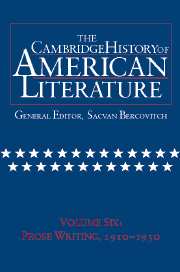Book contents
- Frontmatter
- Introduction
- A Cultural History of the Modern American Novel: Introduction
- 1 A Dream City, Lyric Years, and a Great War
- 2 Fiction in a Tme of Plenty
- 1 When the War Was Over: the Return of Detachment
- 2 The “Jazz Age” and the “Lost Generation” Revisited
- 3 The Perils of Plenty, or How The Twenties Acquired a Paranoid Tilt
- 4 Disenchantment, Flight, and The Rise of Professionalism in an Age of Plenty
- 5 Class, Power, and Violence in a New Age
- 6 The Fear of Feminization and The Logic of Modest Ambition
- 7 Marginality and Authority / Race, Gender, and Region
- 8 War as Metaphor: The Example of Ernest Hemingway
- 3 The Fate of Writing During the Great Depression
- Fictions of the Harlem Renaissance
- Ethnic Modernism
- Chronology
- Bibliography
- Index
7 - Marginality and Authority / Race, Gender, and Region
from 2 - Fiction in a Tme of Plenty
Published online by Cambridge University Press: 28 March 2008
- Frontmatter
- Introduction
- A Cultural History of the Modern American Novel: Introduction
- 1 A Dream City, Lyric Years, and a Great War
- 2 Fiction in a Tme of Plenty
- 1 When the War Was Over: the Return of Detachment
- 2 The “Jazz Age” and the “Lost Generation” Revisited
- 3 The Perils of Plenty, or How The Twenties Acquired a Paranoid Tilt
- 4 Disenchantment, Flight, and The Rise of Professionalism in an Age of Plenty
- 5 Class, Power, and Violence in a New Age
- 6 The Fear of Feminization and The Logic of Modest Ambition
- 7 Marginality and Authority / Race, Gender, and Region
- 8 War as Metaphor: The Example of Ernest Hemingway
- 3 The Fate of Writing During the Great Depression
- Fictions of the Harlem Renaissance
- Ethnic Modernism
- Chronology
- Bibliography
- Index
Summary
The resemblances that might have fostered recognitions among writers of the twenties – white of black and male of female – worked more often to divide them. Cowley’s group of “admired writers” coveted the power that accompanied recognition, and once they had achieved it, they held tightly to it. But they also wanted to claim as their own the sense of being marginalized. “That was always my experience,” Fitzgerald observed in 1938: “a poor boy in a rich town; a poor boy in a rich boy’s school; a poor boy in a rich man’s club at Princeton…. I have never been able to forgive the rich for being rich, and it has colored my entire life and works.” Ten years earlier, T. S. Eliot had written Herbert Read, giving his twist to the experience of being an outsider:
Some day I want to write an essay about the point of view of an American who wasn’t an American, because he was born in the South and went to school in New England as a small boy with a nigger drawl, but wasn’t a southerner in the South because his people were northerners in a border state and looked down on all southerners and Virginians, and who so was never anything anywhere and who therefore felt himself to be more a Frenchman than an American and more an Englishman than a Frenchman and yet felt that the U.S.A. up to a hundred years ago was a family extension.
- Type
- Chapter
- Information
- The Cambridge History of American Literature , pp. 160 - 169Publisher: Cambridge University PressPrint publication year: 2002



